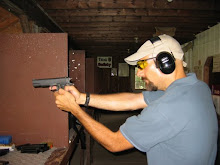One less skill for soldiers to master at boot camp: bayonet training
"US troops hadn’t launched a bayonet charge since 1951" What? Do you honestly expect me to believe that the Northeast Bloggers are ahead of the Armed Forces of the United States? Who's going to protect our shores from the rampaging Pokemon hoards?When a US Army general made the decision recently to remove bayonet assaults from the array of skills soldiers must learn during basic training, it seemed like a no-brainer.
US troops hadn’t launched a bayonet charge since 1951 during the Korean War. And new soldiers preparing for an increasingly violent war in Afghanistan already need to learn far more skills than the 10 weeks of basic training allows, says Lt. Gen. Mark Hertling, head of initial entry training and the Army’s Training and Doctrine Command.
While it's understandable that - as a practical skill - bayonet fighting tactics are part of a bygone era, there is a notable reason to continue:
In 2004, with ammunition running low, a British unit launched a bayonet charge toward a trench outside of Basra, Iraq, where some 100 members of the Mahdi Army militia were staging an attack. The British soldiers later said that though some of the insurgents were wounded in the bayonet charge itself, others were simply terrified into surrender.From the Spartans to the Berserkers to the Gurkhas, history is replete with warriors who should have lost battles due to inferior numbers, armaments, or tactical advantage - yet didn't. The sheer psychological toll that their deeply ingrained reputations as fearless fighters brought gave them the edge needed to prevail.Instilling such terror is at the heart of the philosophical argument for keeping bayonet training, historians say.
Besides, affixing bayonets and charging the enemy in a last-ditch attack sure beats getting captured and beheaded, right?
That is all.
Story brought to us by commenter Stretch, who opines "Clearly not a good idea. But I still think we should be using .45s and bolt action rifles."







14 comments:
I'm sorry to hear that bayonet training is discontinued! When I was a pasty faced Marine recruit in 1987, we didn't see the point of it much either. I'm especially fond of the memory of a Drill Instructor telling my platoon mates and I that a body might get lodged on the bayonet due to the blade getting jammed in the ribs. Easy solution? Sure, just fire a round. We all thought about it but one poor s.o.b. actually raised his hand. "Sir, what are we doing in a knife fight if we still have bullets?" Ah, the joys of the quarterdeck and hours of calisthenics.
Bayonet training is about more than fixing pointy things to rifles and going over the top. It's about awakening slumbering aggression, about turning civilians into fighters, about making one realize that war will be bloody, loud, dirty and tough. In my time we were taught that the M16A2 and bayonet were a club, a spear, a second chance to live! Bare hands, rocks, weapons of opportunity, your teeth, your skull, everything was a weapon when the chips were down.
It's a shame.
The Army might be discontinuing bayonet training, but I'd guess that the USMC isn't.
Then there is this,
British officer wins two gallantry awards for fending off Taliban attack with bayonet
"I either wasted vital seconds changing the magazine on my rifle or went over the top and did it more quickly with the bayonet.
"I took the second option. I jumped up over the bank of the river. He was just over the other side, almost touching distance.
I meant to add, those British soldiers do seem to love their bayonets.
If you study history and tactics of the Revolutionary War era, you learn that the great strength of the British on the battlefield was due in large part to bayonet charges.
It wasn't the volley of musket fire that broke the lines being charged by the British. It was their unrelenting pace, bayonets affixed, approaching the enemy line. The sight of disciplined red coats marching without pause into enemy fire to engage with bayonets often broke the line before they arrived.
Contrary to movies, a British bayonet charge was a very regimented affair and done at a slow, steady pace of around 50 paces a minute. It was just one more disciplined action to be performed by the numbers.
One of the reasons the British love bayonets is rooted in their combat history. Lesser foes simply ran for their lives. Who wouldn't when volleys fired into the British would drop men but their comrades would simply step over them and keep on marching. That took serious steel and courage to do that. It is no wonder that any enemy left behind after witnessing that would be demoralized and subsequently slaughtered.
I hope this doesn't have a detrimental effect on the annual NEBS bayo charge.
wv: "goinc" I'm goinc now...
I have got to get me a gun with a bayonet on it...
It won't be missed by soldiers in basic training.
My day and change of bayonet training was some of the most useless training I got over the course of my army time.
That day could have been better spent with hand to hand training (combatatives) or additional range or weapon familiarization time.
Should it be totally forgotten?
No, but it should be more up to the units these future soldiers end up in if they are going to engage in this sort of training.
For something used once or twice by the US army the pay out for days training is pretty low.
It is more about discipline I think than anything and getting a killer mindset in place.
Jay I bet you have not received formal bayonet training, do you think though that you would really need some to use it on that shotty you love so? :)
Meh.
They'll probably just teach it later at AIT or SOI.
Waste of time in Basic, not everyone ends up on the tip of the spear.
The Army may be dropping it, but the Marines ARE NOT!
And the Marines should not. 'Every Marine is a rifleman'.
But really, why would a translator or artilleryman be practicing bayonet drills?
I'm sure I read somewhere that one U.S. unit did a successful bayonet charge in Vietnam.
Can't remember where I read it, however.
My Army Buddy (Military Police) tells me his unit had no problems using Bayonets during OIF 1 for prisoner transfers (30 Iragi prisoners vs. 4 U.S. troops moving them down the road) and Riot Control. They never had to do a Formal Charge, but he said that when they put on the Cold Steel, most of the Crowd would run away. So there are two valid reasons to maintain Bayonet Skills. Plus, I'm sure there have been many incidents over the decades where various small units used them in Combat, but there was no Cameras around to capture the action.
Fixed bayonets are one of the best crowd control devices ever invented.
Post a Comment